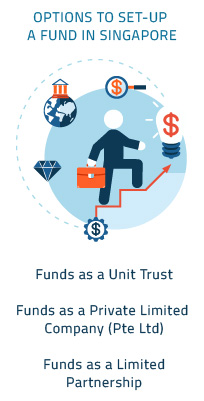Singapore Fund Management Company Setup Guide
How to Set Up a Fund Management Company in Singapore

Under the Securities and Futures Act (SFA), companies wishing to engage in the business of fund management in Singapore are either a licensed fund management company (LFMC) holding a Capital Markets Services (CMS) licence in fund management, or a registered fund management company (RFMC) with the Monetary Authority of Singapore (MAS). The business of fund management means that the company’s activities involve making investment decisions regarding a pool of money or assets, on behalf of customers.
Options to Set-up a Fund in Singapore
There are three possible legal forms for funds to be set up in Singapore – unit trusts, private limited companies, or limited partnerships, with each having its own advantages and disadvantages.
Funds as a Unit Trust
This is a popular choice for mutual funds and has the additional advantage of not being governed by the Singapore Companies Act. But the compliance cost may be higher as it is mandatory for unit trusts in Singapore to appoint a Licensed Collective Investment Scheme (CIS) Trustee.
Funds as a Private Limited Company (Pte Ltd)
This option is popular among private equity funds investing in Asia so as to take advantage of Singapore’s wide array of tax treaties with regions/countries across the world. Notably, the city-state’s cross-border tax treaties apply only to Pte Ltd.
 A slight disadvantage is that Pte Ltd (referred to as company/companies henceforth) in Singapore has to be compliant with Singapore Companies Act and fulfill the following requirements at all times:
A slight disadvantage is that Pte Ltd (referred to as company/companies henceforth) in Singapore has to be compliant with Singapore Companies Act and fulfill the following requirements at all times:
- Make annual filings to both ACRA (national registrar of companies) and IRAS (tax regulatory body).
- All subscriptions and redemptions from the fund are subject to the Companies Act. This means that whenever an investor invests in funds structured as a company via redeemable preference shares in Singapore, the details must be updated with ACRA and relevant resolutions prepared.
Moreover, as some information about companies in Singapore is publicly available, this will apply to the newly set-up funds, which may sometimes be undesirable.
Recommended for you: More on Types of Singapore Business Entities »
Funds as a Limited Partnership
A popular choice worldwide and suitable to Singapore as well, with the only drawback being the fund not able to benefit from Singapore’s cross-border tax treaties. But the advantages are lesser compliance requirements (as these are governed by the Limited Partnership Act in Singapore and not by the Companies Act) and far less required public disclosure than companies.
Benefits of Establishing a Registered Fund Management Company in Singapore
In the changed economic paradigm of the world, Asia is where money is, and Singapore, with its financial infrastructure and strategic location, is ideally suited to be the continent’s financial hub. We summarise the advantages below.

- Competitive, transparent and efficient territorial low tax regime
- Extensive tax treaty network worldwide (currently over 76 full and eight limited treaties in place)
- No capital gains tax
- Several tax exemptions schemes such as 13R, 13X, and 13CA (detailed below) specifically for the fund management industry
- Benefits from various other tax incentives schemes available to all Singapore companies such as Corporate Tax Rebate, PIC etc.
- Strong regulatory environment and investor protection
- World’s best in ease in doing business (consecutive top ranking in World Bank surveys)
- Robust IP protection
- Efficient legal system
- English-educated local workforce
- Proximity to emerging markets of Asia
- Open-door immigration policy for foreign professionals
- Home to over 125 financial institutions, with five local banks rated among the world’s strongest
Requirements to Set Up a Fund Management Company (FMC)
MAS mandates that the category a corporation chooses accommodates its needs over a reasonable time frame. The different categories of FMCs available in Singapore are as below:
RFMCs

RFMCs pertain to those carrying on fund management business with no more than 30 qualified investors (of which no more than 15 may be funds or limited partnership fund structures) and the total value of the assets managed does not exceed S$250 million.
Qualified investors in Singapore include accredited investors, which are individuals whose net personal assets exceed S$2 million, or whose income in the preceding 12 months is not less than S$300,000; and corporations whose net assets exceed S$10 million.
The definition of qualified investors also includes collective investment schemes (offered in Singapore only to accredited investors) and closed-end funds (whose holders are accredited investors only).
LFMCs
There are two types of LFMCs:
- Retail LFMCs – carrying on fund management business with all types of investors.
- A/I LFMCs – carrying on fund management business with qualified investors only, with no restrictions on the numbers.
The requirements to set up the above three types/subtypes of FMCs can be summarised as:
| RFMC | Retail LFMC | A/I LFMC | |
|---|---|---|---|
| Investors type and number allowed | Qualified investors only, with number restricted to 30 (up to 15 can be funds) | All investors with no restriction on numbers | Qualified investors only with no restrictions on numbers |
| Minimum base capital requirements | S$250,000 | Either S$500,000 or S$1 million | S$250,000 |
| Risk-based capital requirement | None | Yes, financial resources at least 120% of operational risk requirement | |
| Risk management framework and internal audit requirements |
Mandatory | ||
| Reporting requirements | Annual | Annual as well as quarterly | |
| Professional Indemnity Insurance (“PII”) | Not compulsory but recommended | Mandatory | Not compulsory but recommended |
| Compliance structure | Out-sourcing allowed | No outsourcing allowed. Must have full-time independent compliance function. | Outsourcing allowed only when assets under management (AUM) is less than S$1 billion. |
| Number of directors and their residential requirement in Singapore | At least two directors with more than five years of relevant experience, with at least one being executive and full-time resident in Singapore | At least two directors with more than five years of relevant experience, with at least one (with more than 10 years of experience) being executive and full-time resident in Singapore | At least two directors with more than five years of relevant experience, with at least one being executive and full-time resident in Singapore |
| Company officials with mandatory residence in Singapore (including the resident director) | At least two with more than five years of relevant experience | At least three with more than five years of relevant experience | At least two with more than five years of relevant experience |
Applying for a Capital Markets Services (CMS) Licence or Registration

An FMC shall submit its application for licensing or registration to MAS following the steps below:
- Registering with MAS as an RFMC through the Corporate Electronic Lodgement or CeL
- Applying for CMS licence in fund management through CeL and, where applicable to the applicant’s business model, such additional SFA regulated activities of dealing in securities, trading in futures contracts, and/or leveraged foreign exchange trading.
- Applying for CMS licence in fund management through the hardcopy of SF(LCB)R Form 1 and, where applicable to the applicant’s business model, such additional SFA regulated activities that include activities not listed above.
Processing Time
MAS states that “the processing time for a fully completed application from an applicant that meets the admission criteria will be approximately 12 weeks, excluding any delays caused by factors beyond MAS’ control”. Incomplete submissions or those not fulfilling the criteria are informed accordingly. Such applicants may re-submit a fresh application when it is ready to do so.
Business Cessation of a Fund Management Company

MAS also mandates that an FMC should ensure an orderly winding down of its business prior to cessation. This includes ensuring a sufficient notice period has been given to its customers, business partners, and other relevant stakeholders regarding its cessation; and discharging all customer obligations before it ceases.
The requirements for LFMC and RFMC for cessation of businesses are as follows:
- An LFMC is required to return its licence to MAS and to file a notice of cessation of business – Form 7 of the SF(LCB)R, not later than 14 days after the cessation of its business.
- An RFMC is required to file a notice of cessation of business – Form 24A of the SF(LCB)R, prior to the cessation.
Tax Incentives for a Fund Management Company in Singapore
In a bid to encourage the development of the fund management industry in the country, Singapore has implemented a number of schemes as detailed below.
Goods & Services Tax (GST) Remission Scheme for Funds
 The scheme (for which no approval is required) is for Singapore-based funds, which are unable to claim GST incurred on goods or services under the normal GST rules. To be eligible, a fund must have been granted approval for income-tax concessions (under the schemes 13R or 13X, amongst others). In addition, the fund must have a prescribed fund manager in Singapore (either one who is licensed, registered or otherwise exempted).
The scheme (for which no approval is required) is for Singapore-based funds, which are unable to claim GST incurred on goods or services under the normal GST rules. To be eligible, a fund must have been granted approval for income-tax concessions (under the schemes 13R or 13X, amongst others). In addition, the fund must have a prescribed fund manager in Singapore (either one who is licensed, registered or otherwise exempted).
The scheme is beneficial because generally, funds in Singapore cannot claim input GST as they cannot register for GST due to not making taxable supplies. But under this scheme, input GST on nearly all expenses borne by the fund in relation to the fund’s investment activities will be eligible for relief. The rate of recovery decided by the IRAS is fixed annually.
Notably, this is the only scheme where meeting the requirements automatically entitles the FMC to exemptions. For all the rest (detailed below), approval by MAS (looks at the benefit to Singapore and the company’s growth trajectory) is needed before any tax incentive can be enjoyed by the FMC.
If you liked this: More on Singapore’s Goods & Services Tax »
Financial Sector Initiative – Fund Management Award (FSI – FM)
FMCs in Singapore enjoy a concessionary tax rate of 10 percent instead of the corporate tax rate of 17 percent on income derived from their business of fund management subject to the following conditions and MAS approval:
- FMC must be licensed, registered or exempted from having a capital markets services licence in respect of its fund management or investment advisory activities.
- FMC must employ at least three experienced fund management professionals earning more than S$3,500 per month.
- FMCs must manage assets of at least S$250 million.
- A growth plan for assets is also important.
13R, 13X, and 13CA Schemes for Singapore Fund Management Companies
Under these schemes, specified income from designated investments is exempted from tax. The FMCs taking benefit from these schemes has to file annual tax returns to IRAS and annual declarations to the MAS.
Generally, specified income includes most trading gains and remittances of income into Singapore. Particularly, the designated investments under these schemes cover:

- Stocks and shares of any company
- Debt securities
- Real estate investment trusts, exchange-traded funds, or any other securities which are:
- denominated in foreign currency issued by foreign governments
- listed on any exchange
- issued by supranational bodies; or
- issued by any company
- Futures contracts
- Overseas immovable property
- Deposits in Singapore with any approved bank
- Foreign currency deposits with overseas financial institutions
- Foreign exchange transactions
- Qualifying financial derivatives
- Qualifying unit trusts
Whereas the list of exclusions includes:
- Distributions made by real estate investment trusts
- Interest from qualifying debt securities
- Interest derived from deposits with and certificates of deposit issued by any approved bank and from Asian Dollar bonds
| Resident Fund Scheme (13R) | Enhanced Tier Fund Scheme (13X) | Offshore Fund Scheme (13CA) | |
|---|---|---|---|
| Aimed at | Singapore resident funds incorporated as a company and managed by a Singapore FMC |
all funds (company, trust or limited partnership) over S$50 million managed by a Singapore FMC which employs at least 3investment professionals earning at least S$3,500 per month | non-Singapore funds (non-Singapore company, trust or limited partnership) managed by a Singapore FMC |
| Fund expenditure | at least S$200,000 in business spending including operating costs, salaries and management fees | No restrictions | |
Form a fund management company in Singapore with speed, ease and value
Rikvin’s expertise is unrivaled in Singapore. With 20 years of know-how in company incorporation, accounting, tax, payroll and immigration services, you can count on us to be your dedicated one-stop business solution.

